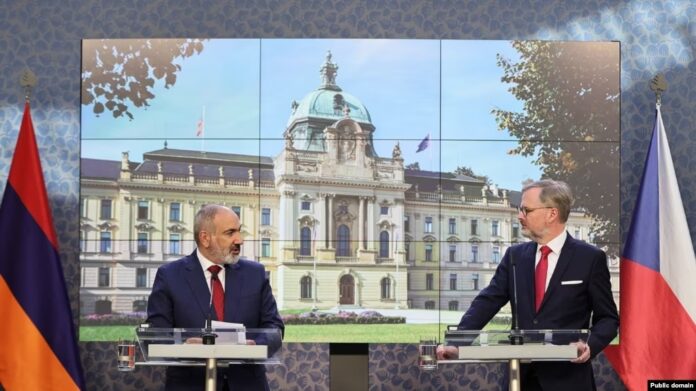PRAGUE (Public Radio of Armenia) — Prime Minister Nikol Pashinyan has urged the international community to give a “clear and targeted” assessment of the “humanitarian crisis” in Nagorno-Karabakh, claiming that Azerbaijan’s actions to cut the Armenian-populated region from Armenia amount to “preparations for ethnic cleansings.”
Speaking at a joint press conference with his Czech counterpart Petr Fiala on an official visit to Prague on May 4, Pashinyan said that the situation in the South Caucasus region remained tense and accused Azerbaijan of continuing its policy of using force and threat of force to escalate tensions on the border with Armenia, in Nagorno-Karabakh and in the Lachin corridor, the only road that connects the region with Armenia where Azerbaijan installed a checkpoint on April 23.
“Azerbaijan’s decision to install a checkpoint in the Lachin corridor and the blockade of the corridor before that are a gross violation of the trilateral statement of November 9, 2020 and the interim decision of the International Court of Justice made in February,” Pashinyan said.
The leaders of Russia, Armenia and Azerbaijan signed a trilateral statement on November 9, 2020 on the cessation of Armenian-Azerbaijani fighting in Nagorno-Karabakh that claimed the lives of nearly 7,000 people on both sides in a matter of a little more than six weeks .
Under the terms of the Moscow-brokered ceasefire agreement, Russia deployed around 2,000 peacekeepers in Nagorno-Karabakh and along a five-kilometer-wide strip of land connecting it with Armenia and known as the Lachin corridor.
Yerevan and Stepanakert insist that Azerbaijan dismantle its checkpoint at the entrance to the Lachin corridor from Armenia and that only Russian peacekeepers remain there as agreed in the trilateral statement.










